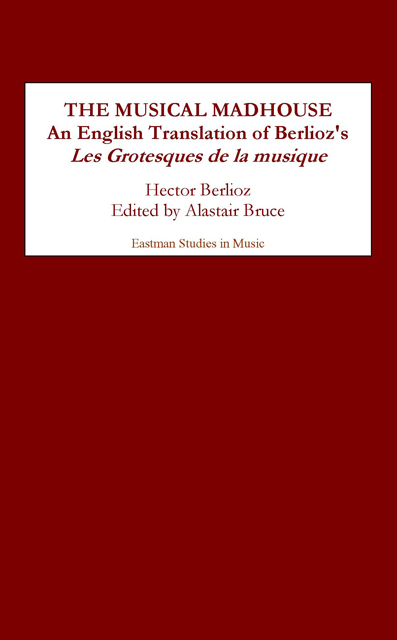Travels in France—Academic Correspondence: Second letter—Lyons
Published online by Cambridge University Press: 21 March 2023
Summary
Lyons—Philharmonic societies—My music teacher—Two anonymous letters— A hurt music-lover—Dinner at Fourvières—The Brains Club—Scandal—The millstone
Paris, 18 …Today I’m neither “hale”, nor “hearty”, nor “full of fun”, and it was some time after the “rising sun” when I made the effort to get up to write to you. I had a rough evening yesterday, you see, and I badly needed my sleep after such an ordeal! The special gala performance given by the Opéra for the benefit of the Welfare Fund included me among its victims. I have realised Balzac’s ideal, and you may consider me today a living personification of his “suffering artist”.
Before recounting my visit to Lyons, let me tell you about this latest event at the Opéra: it will form a prologue to my “Letter from the Provinces”. The programme was all the more appealing for including less music. The notices promised us the second act of Gluck’s Orpheus, but the notices were lying; only the Hades scene was performed, amounting to less than half of the second act. As for the excerpts from Rossini’s Semiramide, they turned out to consist of an aria and a duet preceded by the overture. That was the whole musical freight of an evening which began at seven and finished at midnight. No, I’m wrong, we should also count some Biscayan airs interpolated into the ballet The Apparition, and half the minuet from Mozart’s G minor Symphony, which the orchestra began to play as a curtain-raiser and would dearly have liked to continue if the actors hadn’t come on stage and obliged them to fall silent.
At the Théâtre-Français they treat Mozart with exactly the same degree of respect. Only there the orchestra, unlike that of the Opéra, has no dignity to consider when interrupted like this in the middle of a passage of Mozart—no “noblesse” which “oblige”. You can tell it to “Play on!” when it stops, or “Stop now!” when it’s playing, without wounding its self-esteem; it knows that its role is to be treated like dirt. Mozart and Haydn symphonies serve solely to produce some kind of noise to give notice of the suspension or resumption of dramatic hostilities. At the Opéra, though, the orchestra’s purpose and importance are quite different, and I’d never have believed it would be prepared to behave in such a submissive and demeaning manner. Its reputation for modesty, not to say humility, is henceforth beyond reproach.
- Type
- Chapter
- Information
- The Musical MadhouseAn English Translation of Berlioz's <i>Les Grotesques de la musique</i>, pp. 164 - 175Publisher: Boydell & BrewerPrint publication year: 2003



